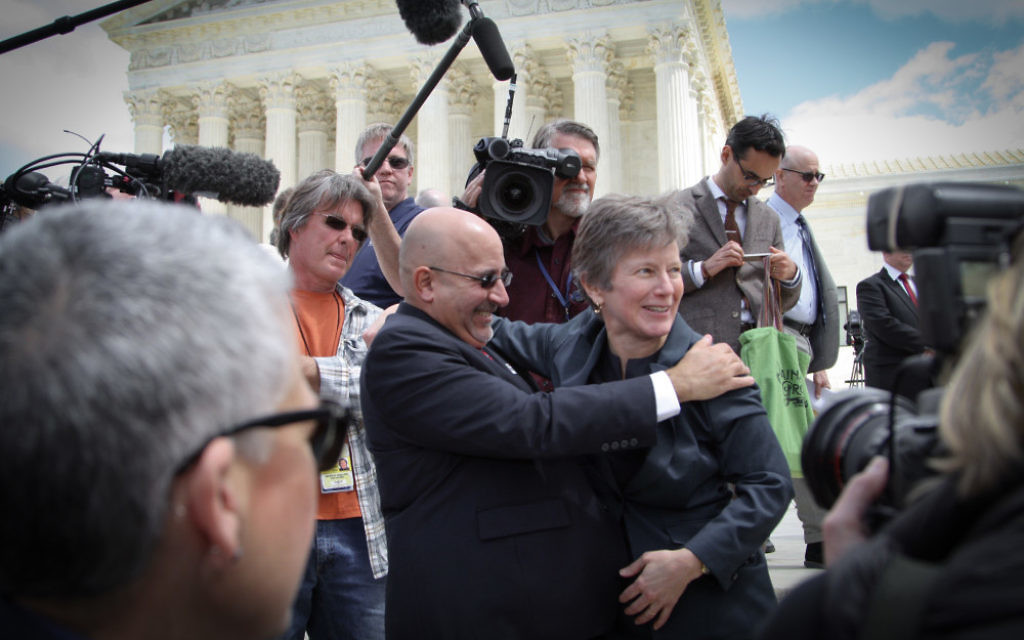AJFF: Pittsburgh Ties Helped Make ‘Marry’ Match
Eddie Rosenstein’s documentary “The Freedom to Marry” centers on civil rights activist Evan Wolfson, whose career began with a 1983 thesis on marriage equality and culminated three decades later with the historic 2015 U.S. Supreme Court decision to legalize same-sex marriage.
Rosenstein spoke with the AJT about Wolfson and the making of “Freedom,” which has four screenings at the Atlanta Jewish Film festival.
Rosenstein grew up in Pittsburgh’s tight-knit Jewish community through which he came to know the Wolfsons. He had a close relationship with their youngest son, and grew up hearing various tales of Evan’s achievements and wearing Wolfson’s hand-me-down sneakers.
Get The AJT Newsletter by email and never miss our top stories Free Sign Up
“I would always get a phone call from my proud mother when Evan would be on TV,” Rosenstein said. “Sometimes it was ‘Face the Nation’ or some Sunday morning news show or on the front page of The New York Times.”
His mother even appears in the film. She is seen seated at a kitchen table, beaming with the oft-told recollection of Wolfson already reading The New York Times by the age of 4.
Wolfson had been approached by filmmakers over the years about his work, but hadn’t felt comfortable with any of the offers. That is, until Rosenstein sent him a note upon hearing the Supreme Court agreed to take the case. Wolfson agreed to see him the next day.
“I think one of the reasons he said yes is that if I screwed this up, my mother would never let me live it down,” Rosenstein said with a laugh. “So that’s how this whole thing came about — just sort of Jewish geography.”
Two days after their conversation, Rosenstein began work on the project that would last the next 18 months. He dedicated seven days a week, 20 hours a day, to tell the story of Wolfson and the marriage equality movement.
“When Evan said that I should make the film and he would give me access to his life and his work and his organization, I came home to my wife and said, ‘What should I do?’ I’ve done this before, and it’s a huge financial and emotional risk for everybody around you,” Rosenstein said. “Luckily, I got her support. She didn’t even flinch.”
Once the narrative began to take shape, Rosenstein had the enormous task of selecting one family among numerous, equally compelling plaintiffs to focus on. It came down to April DeBoer and Jayne Rowse of Michigan, who filed a lawsuit against their state’s ban on adoption by same-sex couples.
Michigan law restricted second-parent adoption to married couples. For a same-sex couple, this meant that if the adopting parent died, the remaining parent would claim no rights.
“I chose April and Jayne because I find it really hard (to see) how someone could not sympathize with April and Jayne,” Rosenstein said. “The state of Michigan was making the case that they were unfit as parents because children were better off with heterosexual parents, with a mom and a dad. These were women who were raising children who had been abandoned by heterosexual moms and left to die in the hospital as drug-addicted infants.”
Rosenstein said his own teenage sons inspired his involvement in telling the story of “The Freedom to Marry.” He taught them tikkun olam (repair of the world) and the need to be a mensch, but they wanted more specifics. It was about making a real impact on real issues when the political climate seemed to be turning against said values.
“I thought, ‘You know what? I need them to meet Evan Wolfson and Mary Bonauto and all the other heroes in this movement who didn’t just talk about it but spent their whole lives working on it.’ That’s the story that I thought was most worth telling,” Rosenstein said. “It isn’t necessarily just about same-sex marriage or Freedom to Marry or one particular group’s rights. It’s the idea that change can happen.”






comments